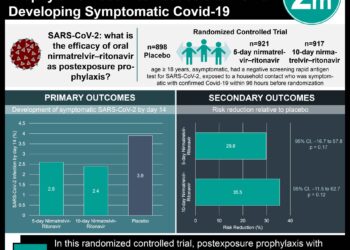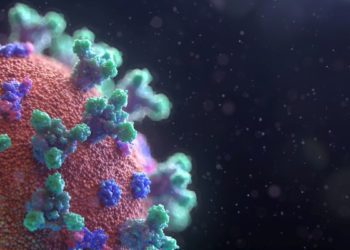Reinfection rates among patients previously testing positive for COVID-19
1. Among a large U.S. cohort, previous infection with SARS-CoV-2 appears to confer high levels of immunity against reinfection for at least 8 months.
Evidence Level Rating: 2 (Good)
As of early March 2021, SARS-CoV-2 has infected nearly 120 million individuals worldwide. The subsequent duration of immunity to reinfection is unknown; infection with common seasonal coronavirus does not tend to confer lasting immunity. Vaccination against SARS-CoV-2 is increasing, but due to shortages, nearly all countries have implemented prioritization schemes. Having a more robust understanding of immunity after confirmed infection has the potential to affect these schemes by delaying vaccination for those with likely immunity to allow access for the more vulnerable. This large cohort study included 612,611 tests from 386,336 individuals (mean [SD] age = 51.4 [22.4] years, 54.5% female) across one healthcare system in both Ohio and Florida, with a 9.9% overall positivity rate. Initial infection status was based on PCR testing performed prior to 30 August 2020. 150,325 patients had tests performed prior to this date, with 8,845 testing positive. After at least 90 days, 1,278 of these previously positive patients were retested, with 62 reviewed for reinfection. 31 of these reinfected patients were symptomatic, and 18 were hospitalized within 30 days of the positive test. The average time to reinfection was 138.9±46.3 days. Among those who initially tested negative, 27.9% (39,487/141,480) were retested, with 5,449 testing positive. Overall, the protection of prior infection against reinfection was determined to be 81.8% (95% CI 76.6% to 85.8%), while against symptomatic infection it was 84.5% (95% CI 77.9% to 89.1%). Protection against reinfection was lowest in months 4 to 5 and increased for up to 8 months after initial infection. There are numerous limitations of this study, such as including only tests from one healthcare system, the possibility of persistent viral shedding from the initial infection past 90 days, and unknown behavioral changes following initial infection affecting future exposures. However, it appears that previous SARS-CoV-2 infection confers high levels of protection against reinfection for at least 8 months, suggesting that patients previously infected may defer vaccination to allow for inoculation of more vulnerable individuals.
Click to read the study in Clinical Infectious Diseases
Image: PD
©2020 2 Minute Medicine, Inc. All rights reserved. No works may be reproduced without expressed written consent from 2 Minute Medicine, Inc. Inquire about licensing here. No article should be construed as medical advice and is not intended as such by the authors or by 2 Minute Medicine, Inc.







